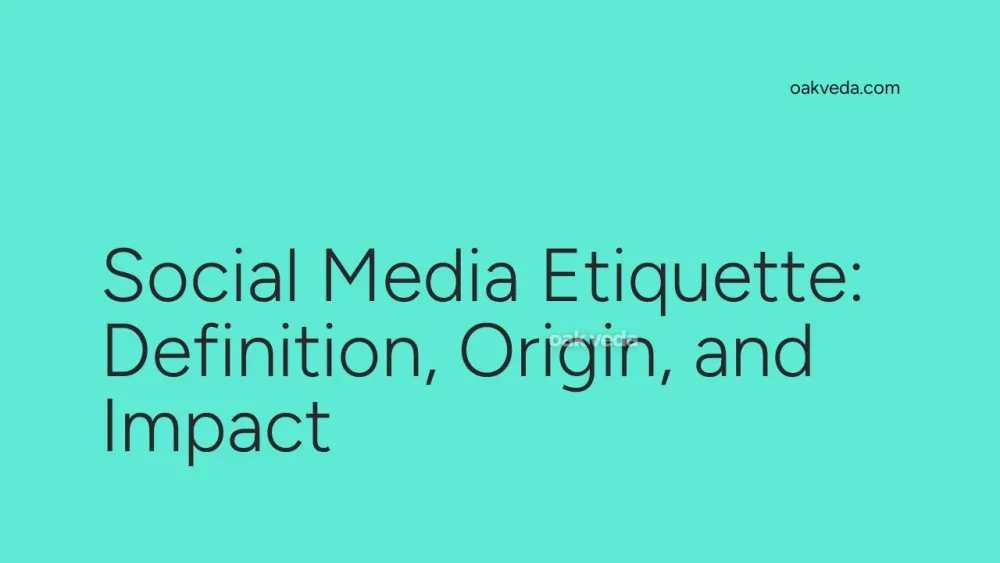
What is Social Media Etiquette?
Social media etiquette refers to the set of unwritten rules and guidelines that govern appropriate behavior and communication on various social media platforms. It encompasses the norms and expectations for respectful, responsible, and constructive interactions in the digital realm. As social media continues to play an increasingly significant role in our daily lives, understanding and practicing proper etiquette has become essential for maintaining positive online relationships and fostering a healthy digital environment.
Origin and Development of Social Media Etiquette
The concept of social media etiquette emerged alongside the rise of social networking platforms in the early 2000s. As these platforms gained popularity and user bases grew, the need for guidelines to manage online interactions became apparent. Initially, social media etiquette was largely informal and evolved organically through user experiences and community-driven norms.
Over time, as social media became more integrated into personal and professional lives, platforms began to develop their own community guidelines and terms of service. These formal rules, combined with user-driven expectations, have shaped the current landscape of social media etiquette.
How Social Media Etiquette Works
Social media etiquette operates on several key principles:
- Respect and Courtesy: Treating others with kindness and consideration, even when disagreeing.
- Privacy and Consent: Respecting others' personal information and obtaining permission before sharing content.
- Authenticity: Being genuine and transparent in online interactions.
- Responsibility: Verifying information before sharing and avoiding the spread of misinformation.
- Professionalism: Maintaining appropriate boundaries between personal and professional online presence.
These principles guide users in navigating the complex social dynamics of online platforms, helping to create a more positive and productive digital environment.
Types of Social Media Etiquette
Social media etiquette can be categorized into several areas:
- Communication Etiquette: This involves using appropriate language, tone, and timing when interacting with others online.
- Content Sharing Etiquette: Guidelines for sharing, reposting, and crediting content created by others.
- Privacy Etiquette: Respecting others' personal boundaries and being mindful of what personal information to share.
- Professional Etiquette: Maintaining a suitable online presence for career-related purposes.
- Platform-Specific Etiquette: Understanding and adhering to the unique norms of different social media platforms.
Popular Examples of Social Media Etiquette
Some common examples of good social media etiquette include:
- Avoiding excessive self-promotion
- Responding to comments and messages in a timely manner
- Using trigger warnings for sensitive content
- Not engaging in or encouraging online harassment
- Fact-checking before sharing news or information
- Respecting others' time zones when tagging or mentioning them
Impact of Social Media Etiquette on Social Media Culture
Proper social media etiquette has a significant impact on online culture:
- Fostering Positive Interactions: It promotes respectful dialogue and reduces conflicts.
- Building Trust: Adhering to etiquette helps establish credibility and trustworthiness online.
- Enhancing Online Communities: It contributes to the creation of supportive and engaging digital spaces.
- Protecting Privacy: Good etiquette helps safeguard personal information in the digital age.
- Promoting Digital Literacy: It encourages users to be more mindful and critical of their online behavior and content consumption.
Controversies Surrounding Social Media Etiquette
While social media etiquette aims to create a positive online environment, it's not without controversies:
- Cultural Differences: What's considered appropriate can vary across cultures, leading to misunderstandings.
- Freedom of Expression: Some argue that strict etiquette guidelines can limit free speech.
- Changing Norms: As platforms evolve, etiquette rules can struggle to keep pace with new features and user behaviors.
- Enforcement: There's ongoing debate about who should be responsible for enforcing social media etiquette – platforms, users, or external regulators.
How Brands and Influencers Use Social Media Etiquette
Brands and influencers leverage social media etiquette to:
- Build Authentic Relationships: By engaging respectfully with their audience, they foster trust and loyalty.
- Manage Crises: Proper etiquette helps in navigating public relations challenges effectively.
- Enhance Brand Image: Consistently demonstrating good online behavior positively impacts brand perception.
- Increase Engagement: Adhering to platform-specific etiquette can improve content visibility and user interaction.
Future Trends Related to Social Media Etiquette
As social media continues to evolve, several trends are shaping the future of online etiquette:
- AI-Powered Moderation: Platforms are increasingly using artificial intelligence to enforce etiquette guidelines.
- Emphasis on Digital Wellbeing: There's a growing focus on etiquette that promotes healthy online habits and mental wellness.
- Cross-Platform Standards: Efforts are being made to establish more consistent etiquette norms across different social media platforms.
- Integration of AR and VR: As augmented and virtual reality become more prevalent in social media, new etiquette guidelines will emerge for these immersive experiences.
FAQs about Social Media Etiquette
-
Why is social media etiquette important? It promotes respectful communication, protects privacy, and creates a positive online environment.
-
How can I improve my social media etiquette? Start by being respectful, thinking before posting, verifying information, and familiarizing yourself with platform-specific guidelines.
-
What are the consequences of poor social media etiquette? Consequences can include damaged relationships, harm to personal or professional reputation, and potential legal issues in severe cases.
-
Is social media etiquette the same across all platforms? While general principles apply universally, each platform may have specific norms and expectations.
-
How does social media etiquette affect businesses? Proper etiquette can enhance a brand's reputation, improve customer relationships, and mitigate potential PR crises.
By understanding and practicing good social media etiquette, users can contribute to a more positive, respectful, and enriching online experience for themselves and others. As social media continues to shape our digital interactions, the importance of etiquette in fostering healthy online communities cannot be overstated.
You may be interested in:
- Stan: Definition, Origin, and Impact on Social Media Culture
- OOMF: Definition, Origin, and Impact on Social Media
- Cringe: Definition, Origin, and Impact on Social Media
- Focus Groups: Definition, Origin, and Impact on Social Media
- Campsite.bio: Definition, Origin, and Impact on Social Media
- Thought Leader: Definition, Origin, and Impact on Social Media

